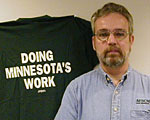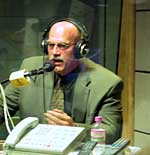Peter Benner: Cerebral AFSCME Veteran
By The Associated Press
October 9, 2001
| |
|
|
|
||
Benner, executive director of American Federation of State, County and Municipal Employees Council 6, is the only one of the four top government and labor officials involved in the current public employees strike who went through the last state workers strike in 1981.
He is highly regarded by many, including Julien Carter, his official foe at the negotiating table.
"I may disagree with him, but AFSCME members should be extremely proud of his leadership and professionalism," says Carter, state commissioner of employee relations.
Benner is the antithesis to the gruff, tough, cigar-chomping union leader. The cerebral, self-effacing 52-year-old studied religious history in college and for 25 years has been a leader of AFSCME.
The native of Waltham, Mass., describes his education as "six years of nuns and eight years of Jesuits (priests)." He's the son of a chemist and a homemaker and of German-Irish-Polish Lithuanian ancestry.
Benner graduated from the College of the Holy Cross in Worcester, Mass., with a degree in history, and earned a master's degree, focusing on religious history, at the University of Iowa.
| |
|
|
|
||
By 1976, he had moved to Minnesota and become a field representative for Council 6 and was its assistant director during the 1981 strike. In 1982 he became executive director.
Benner says the 1981 strike came during the union's infancy and "that's what made us a union. This is a formative moment, too."
"Solidarity sounds like a hokey concept, but people out on the line for weeks form bonds that last years and years," he says.
In the same breath, Benner shrugs off any great global meaning to this particular strike.
"This probably has nothing to do with the resurrection of the American labor movement. Nobody goes on strike to make a historical statement; they do it to address immediate problems and needs in their personal lives."
Benner lives in Inver Grove Heights with his wife, Mary, and son. In his spare time, of which he says there is almost none, he likes to coach his son's athletic teams, read history and walk his dogs.
Other Profiles:
David Fisher - State of Minnesota
Jim Monroe - MAPE
(Copyright 2001 by The Associated Press. All Rights Reserved.)


